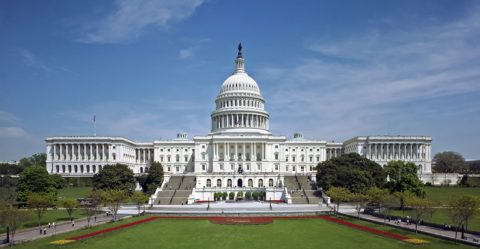Theophilus Chilton, reposting from 2018 (!), explains why the inexorable spread of government everywhere in the west has led us to a situation where every election is “the most important election in history”, and every government decision can infringe upon or even ruin the lives of millions of people as mere side-effect:

The western front of the United States Capitol. The Neoclassical style building is located in Washington, D.C., on top of Capitol Hill at the east end of the National Mall. The Capitol was designated a National Historic Landmark in 1960.
Photo via Wikimedia Commons.
Politics in the United States have become an all-encompassing nightmare from which the average American cannot hope to escape. As American democracy (you know, the “freedom” form of government) expands the reach of the managerial state into every area of modern life, the stakes involved in the political process have mushroomed, with control over the lives of hundreds of millions of people hanging in the balance. It’s little surprise that each election season stretches out over a year, and (as Florida and Georgia recently showed us) doesn’t end once the voting is “officially” over.
It’s reached the point where literally everything is involved in some way with politics. Your choice of restaurant now signals your political inclinations, and thus who will harass you while eating there. Businesses themselves feel compelled to virtue signal, usually in a leftward direction, lest they bring upon themselves threats of boycott, bad publicity, or worse. It has escalated to the point where being the public face of the “wrong” side earns you harassment and menace to your physical health, as Tucker Carlson and several Republican members of Congress have found out. Expressing the “wrong” opinions in the workplace or online can get you reprimanded or fired.
How did we reach that point?
It hearkens back to something I wrote about earlier concerning the tyranny of the technical society. In our particular case, we are seeing a situation playing out in real time whereby “political techniques” first pioneered by Lenin in establishing and maintaining Soviet control over Russia are being used to bring every facet of modern life into the political realm. Every action and attitude has a political ramification which can affect your employment, your access to social amenities, and even (eventually) your freedom from the gulag.
This omnipolitisation leads inevitably into a dichotomy between formal and informal power in the US governing system. Formal power is exactly as it sounds – the “constitutional” (written or otherwise) distribution of decision and policy-making authority in a government, i.e. which entity or body gets to legally do what. This usually involves theoretical limits on the roles or extent of governing authority, which sets it in opposition to the principle of omnipolitics. Conversely, informal power is also exactly as it sounds – it is power wielded extra-constitutionally (yet in a very real sense) by those who “shouldn’t” be exercising it, but nevertheless are.



